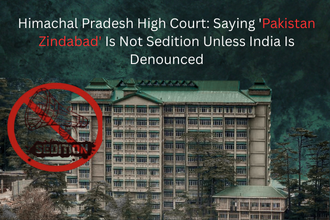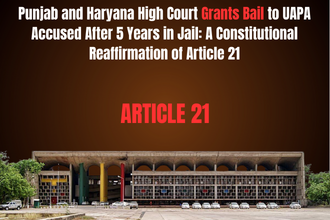The Himachal Pradesh High Court, in a significant ruling on August 19, 2025, clarified that chanting slogans like “Pakistan Zindabad” or praising another country does not amount to sedition unless there is an explicit attempt to denounce India or incite subversive activities. The decision came in the case Suleman v. State of Himachal Pradesh, where Justice Rakesh Kainthla granted bail to a man accused of sharing an AI-generated image of Prime Minister Narendra Modi with the words “Pakistan Zindabad”.
This judgment reopens the debate on free speech, sedition, and national integrity under the Bharatiya Nyaya Sanhita (BNS), the new criminal law framework that replaced the Indian Penal Code (IPC).
Background of the Case
The accused, Suleman, was booked in May 2025 by the Paonta Sahib police in Sirmour district, under Section 152 of the Bharatiya Nyaya Sanhita (BNS), which penalizes acts endangering the unity and integrity of India. Section 152 is a successor provision to the much-debated Section 124A of the IPC (sedition law).
The case arose when Suleman allegedly shared an AI-generated image of Prime Minister Narendra Modi with the caption “Pakistan Zindabad.” The post was perceived as inflammatory and anti-national, leading to criminal proceedings. Suleman surrendered before the police on July 8, 2025, and his bail application eventually reached the High Court.
Key Observations of the High Court
Justice Rakesh Kainthla, while granting bail, made the following crucial observations:
- Praising another country is not sedition unless India is denounced
- The Court emphasized that merely saying “Pakistan Zindabad” does not amount to sedition.
- For sedition (or its modern equivalent under Section 152 BNS), there must be an attempt to incite armed rebellion, separatist activities, or hatred against India.
- Absence of hatred or discontent towards India
- The Court noted that there was no allegation that the accused’s actions had caused hatred, contempt, or disaffection against the government established by law in India.
- Custody not required
- Since the chargesheet was already filed and the electronic device had been seized for forensic examination, the Court held that further custodial interrogation was unnecessary.
- Justice Kainthla remarked:
“The police have filed the chargesheet, and there is nothing to show that the custodial interrogation of the petitioner is necessary. Therefore, no fruitful purpose would be served by detaining the petitioner in custody.”
- Constitutional balance between free speech and national security
- The ruling implicitly reaffirmed the constitutional principle that free expression cannot be curtailed unless it has a clear tendency to incite violence or threaten national unity.
Arguments Before the Court
- Petitioner’s Argument
Advocate Anubhav Chopra, appearing for Suleman, contended that: - His client was falsely implicated in the case.
- Since the chargesheet was already filed, further custody served no purpose.
- The alleged act, even if true, did not amount to sedition under Section 152 BNS.
- State’s Argument
The Additional Advocate General Lokinder Kutlheria, assisted by Deputy Advocates General Prashant Sen, Ajit Sharma, and Sunena Chanhari, argued that: - The post was made at a time when India-Pakistan relations were strained.
- Writing “Pakistan Zindabad” should be treated as anti-national and against the country’s interests.
The Court, however, was not convinced by the State’s argument and held that mere slogans without incitement cannot be criminalized.
Section 152 BNS and Sedition: A Legal Context
The case is significant because Section 152 of the BNS is directly linked to the abolished Section 124A IPC (sedition law).
- Section 124A IPC (Sedition): Punished words or acts that brought hatred, contempt, or disaffection against the government.
- Section 152 BNS: Criminalizes acts endangering the unity and integrity of India.
The Supreme Court has, in past cases, clarified the scope of sedition:
- In Kedar Nath Singh v. State of Bihar (1962), the Court upheld sedition law but limited its application to acts involving incitement to violence or intention to create public disorder.
- In Balwant Singh v. State of Punjab (1995), the Supreme Court held that mere slogans like “Khalistan Zindabad” raised casually without incitement cannot constitute sedition.
The Himachal Pradesh High Court’s ruling in Suleman v. State of Himachal Pradesh follows this judicial tradition of protecting free speech from over-criminalization.
Implications of the Ruling
- Free Speech Reinforced
- The judgment strengthens the principle that freedom of expression under Article 19(1)(a) of the Constitution cannot be curtailed unless it poses a real threat to sovereignty or public order.
- Limits of Sedition under BNS
- The ruling narrows the scope of Section 152 BNS, ensuring it cannot be misused against individuals for casual remarks, slogans, or social media posts unless they directly endanger India’s unity.
- Digital Age Context
- Since the case involved an AI-generated image, the ruling sets an important precedent for online expression and political satire. It recognizes that criticism or slogans on social media must be carefully distinguished from genuine anti-national activity.
- Checks on State Power
- By granting bail, the Court signaled that criminal law cannot be used as a tool for political or emotional retaliation, especially in cases where no actual harm is caused to the nation’s integrity.
Conclusion
The Himachal Pradesh High Court’s decision in Suleman v. State of Himachal Pradesh reiterates a vital constitutional principle: free speech, even if unpopular, cannot be criminalized as sedition unless it poses a real threat to India’s sovereignty or unity.
Justice Rakesh Kainthla’s ruling emphasizes that saying “Pakistan Zindabad” in itself does not constitute sedition unless accompanied by a denouncement of India or an incitement to separatist activity. By granting bail, the Court safeguarded both the rights of the accused and the spirit of democracy.
This judgment not only clarifies the scope of Section 152 BNS but also ensures that the legacy of arbitrary sedition prosecutions under Section 124A IPC does not continue under the new criminal laws.
At a time when freedom of speech and digital expression are under constant scrutiny, this decision stands as a reminder that democracy thrives when dissent and expression are protected—and not stifled under the guise of sedition.
Also Read
Supreme Court Clarifies Scope of Section 195 CrPC: No Splitting of Offences to Bypass Safeguards



